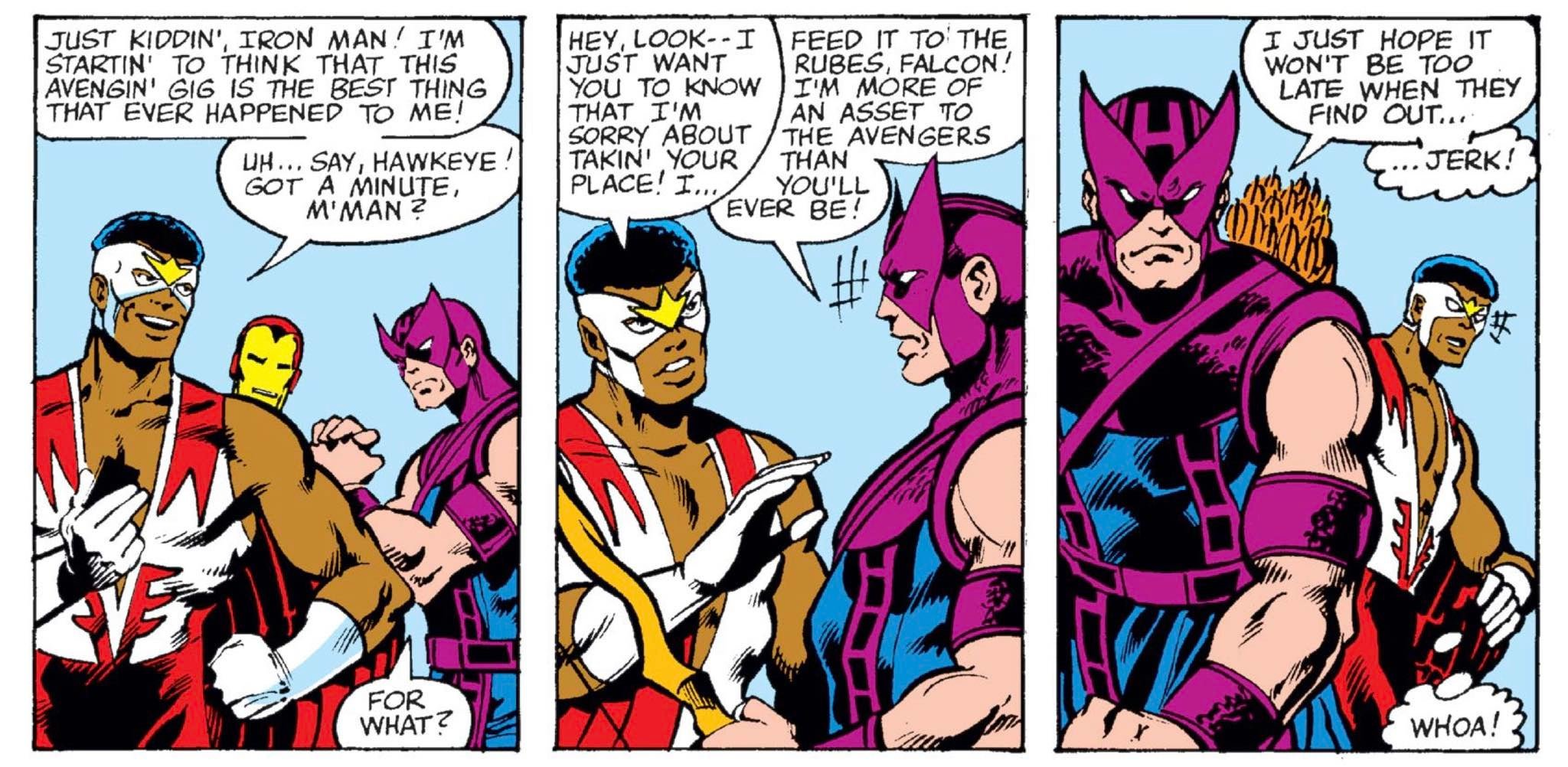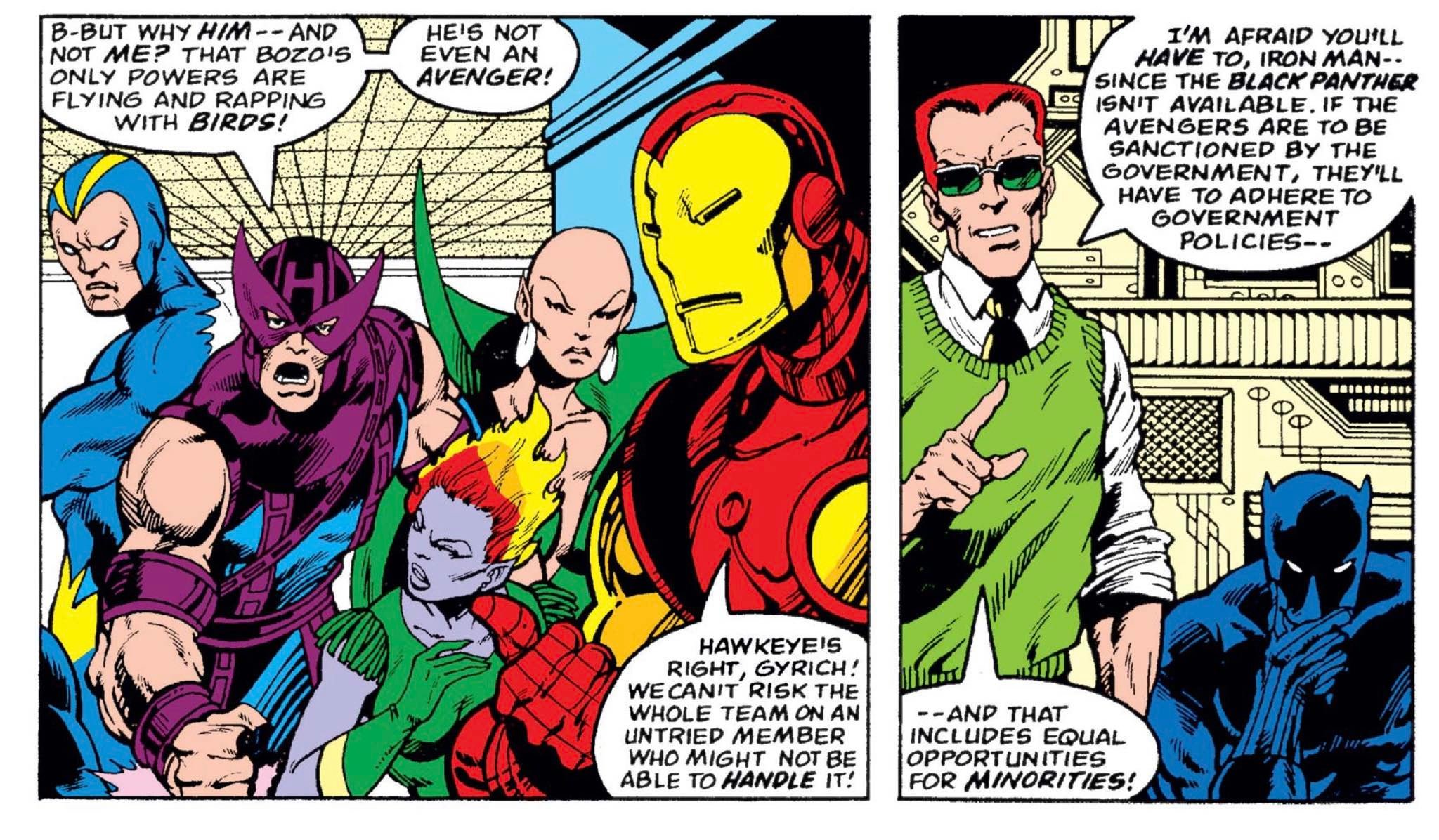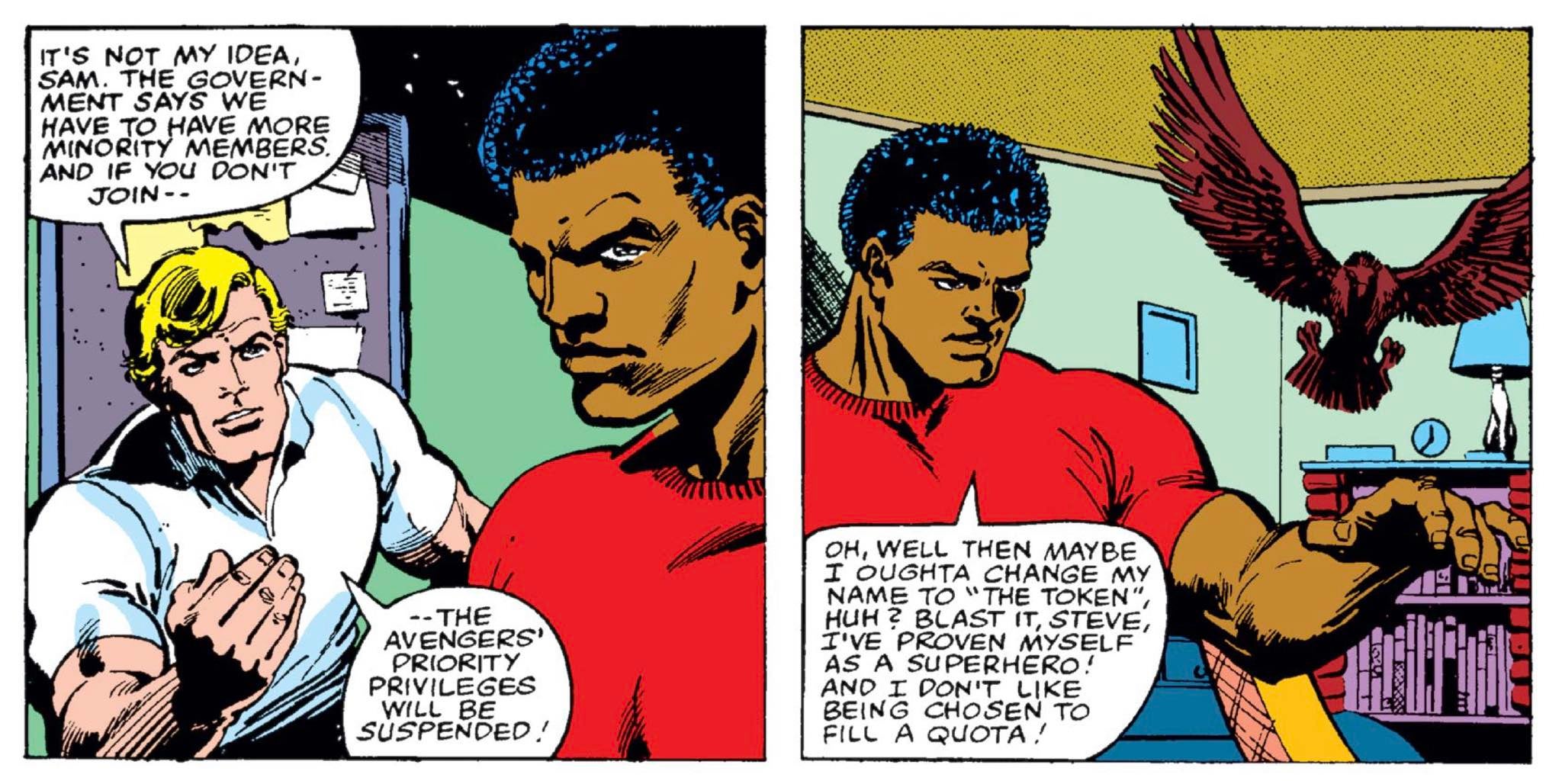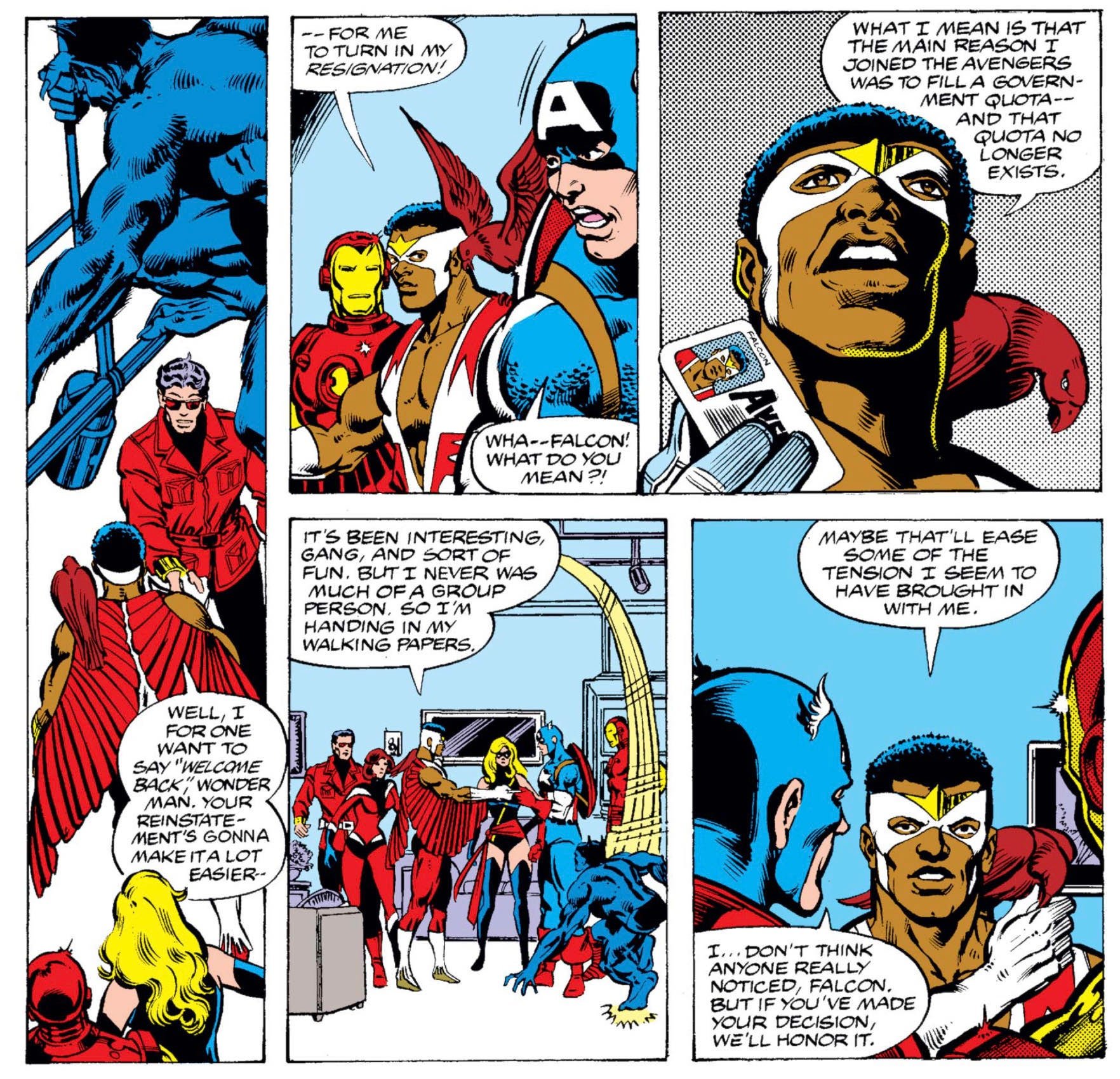If you click on a link and make a purchase we may receive a small commission. Read our editorial policy.
Marvel confronts the Avengers’ Affirmative Action past
A recent issue of Captain America reflected on how the Avengers handled Affirmative Action during the Bronze Age.

The Marvel Universe is an inclusive place, but it wasn’t always that way. Marvel has a proud roster of heroes of color, but some of their early stories were less than sensitive. Sam Wilson is a great example. Today, Sam Wilson is Captain America, and one of Marvel’s premier heroes. However, his first stint with the Avengers could have been handled better.
In 1978 Marvel attempted to tackle Affirmative Action, resulting in a storyline that hasn’t aged well. July 2023's Captain America #750 addresses the story with modern day hindsight, showing how far the publisher has come. What happened to Sam Wilson in the Bronze Age, and how is it being addressed now? Let’s take a look.
Warning: Spoilers ahead Captain America #750!
How Falcon joined the Avengers

There’s no easy way to say this, but in 1978 Marvel Comics had a hard time depicting race in comics. Their intentions may have been good, but they still had a lot to learn. Although Marvel had introduced numerous black characters in strong roles, there were a few stumbles along the way. Just take a look at Sam Wilson’s original stint in the Avengers.
It all began in Avengers #181 (1978). At the time the Avengers were under government control, with a special agent named Henry Gyrich dictating the team’s various activities, including their roster. During a team meeting, Gyrich informed the heroes that the superhero known as Falcon would be joining their roster.
“Since the Black Panter isn’t available, if the Avengers are to be sanctioned by the government, they’ll have to adhere to government policies and that includes equal opportunities for minorities,” Gyrich said.
Although Gyrich doesn’t mention it directly, the policy he’s referring to comes from Executive Order 1095, which enforced equal employment opportunities for everyone, regardless of their race, creed, color, or national origin. This resulted in the formation of the Equal Employment Opportunity Commission, a federal agency responsible for enforcing Executive Order 1095. The policy is commonly referred to as Affirmative Action, which is taken from a phrase in the original executive order.
As Brian Cronin mentions in his CBR article, what’s presented in Avengers #181 is actually a twisted version of what Affirmative Action is supposed to be. “Obviously, there are a couple of things that are a bit off in this whole thing. One, Equal Opportunity Employment means just that. You give applicants an equal opportunity. It does not mean giving an African-American a job that he or she did not even apply for,” Cronin wrote.
You read that last part correctly; Falcon was not present during this conversation. He hadn’t asked about joining the Avengers and was unaware that Gyrich was mandating his membership. It’s also a bit gross to have Gyrich justify his choice by saying “Black Panter isn’t available.”
The insensitive Avengers invitation

If you thought Gryich’s comments were insensitive, then wait until you see how the Avengers reacted to the news. “Minorities?! Just what do you think androids are? And mutants? And for that matter super-heroes,” Iron Man asked. Yes, Iron Man is absolutely making a false equivalency between African-Americans and super-heroes.
“This entire situation is absurd! The Avengers is an elite group,” Quicksilver protests. I really wish he hadn’t used the term 'elite' here. It’s a good thing Falcon wasn’t there to hear these comments, because they are far from welcoming.
The point of conflict is the Avengers fighting back against a government that is trying to control them. The problem is, their argument focuses on Falcon’s worth to the team, and they’re framing their protests in ways that undermine Sam Wilson’s worth as a hero. Captain America is the only one in the group who sticks up for him, due to their history as allies.
In Avengers #183 (1979) Captain America approaches Sam about joining the team. “It’s not my idea, Sam. The government says we have to have more minority members. And if you don’t join, the Avengers’ priority privileges will be suspended,” Cap says.
Of all the pitches he could have made, this is the worst one. It immediately tells Sam that he isn’t wanted, while telling him that the Avengers will lose their status if he doesn’t comply. It’s more or less emotional blackmail, even if that wasn’t how Steve intended it.
“I ougtha change my name to the Token huh? Blast it, Steve, I’ve proven myself as a superhero! And I don’t like being chosen to fill a quota,” Sam says. Despite his reservations, he joins the team. However, the way Cap presented the invite doesn’t start things off on the best footing. Unfortunately, the other Avengers don’t make it any better.
Falcon’s uncomfortable Avengers tenure

The Avengers may have offered Falcon a seat at the table, but they didn’t do anything to make him feel welcomed there. Sam Wilson’s time in the Avengers was plagued by insecurities, as he constantly felt he had to prove his worth to the team. This was made worse by comments other heroes made, particularly Hawkeye.
Hawkeye was resentful because Agent Gyrich had given Falcon his spot on the team. Hawkeye was never shy about telling Falcon he didn’t deserve the spot, and he was only there to fill a quota. In Avengers #185, Hawkeye mockingly referred to Falcon’s inclusion as “the wheels of progress.” In Avengers #189, Falcon tried to clear the air with Hawkeye, but the archer wasn’t in the mood. “I’m more of an asset to the Avengers than you’ll ever be. I just hope it won’t be too late when they find out,” Hawkeye said.
The comments are bad, but what makes them worse is how the other Avengers react to them. They brush off Hawkeye’s comments, and half-heartedly tell Sam he’s just being a blowhard. None of them rush to Sam’s defense, and none of them tell him that he’s a valued member of the team.
In Avengers #188, the team debates their next move during a mission, and Sam is the only person who isn’t polled. “I kept my mouth shut, waiting to see when somebody would ask my opinion! But nobody thought to consult the token,” Sam pondered.
It should come as no surprise that Falcon left the team in Avengers #194. At that point the government was no longer controlling the group, eliminating any roster mandates. “The main reason I joined the Avengers was to fill a government quota, and that quota no longer exists,” Sam said.
Sam goes on to say that his departure should ease any tensions his inclusion caused. “I don’t think anyone really noticed Falcon,” Captain America replies. Reading this with modern day hindsight, we could see what Cap is doing wrong here. Sam is finally expressing how the team’s treatment has affected him, and Cap dismisses it.
As Falcon flies away, Ms. Marvel adds insult to injury with her parting words. “After all the gripes we had about the Falcon being forced on us by the government, I think I’m going to miss him,” Carol says. The sentiment is almost nice, but it reminds Sam that he was “forced” onto the team against their will.
How Captain America #750 deals with the Avengers’ Affirmative Action past

Marvel has come a long way since 1978. Sam Wilson has rejoined the Avengers on numerous occasions, and even served as their leader for a time. He’s proved his worth as a hero many times over (not that he needed to) and has even been entrusted with the Captain America mantle.
This brings us to Captain America #750, where Sam reflects on his difficult beginnings with the Avengers. Speaking to a group of high school graduates in Harlem, Sam shares his story. “I was offered a spot on the team due to a government mandate, which put me in an uncomfortable position,” Sam said. “I found myself overcompensating in the hopes of keeping anyone else on the team from questioning my abilities. This began to take a toll on me mentally.”
Sam recounts how he left the team but would eventually return on his own terms. He tells the graduates about his transformation into Captain America, and eventually a proud leader of the Avengers. “As you enter the world, I hope you find it within yourselves to have faith in who you are and what you are capable of, no matter what circumstances make you feel otherwise. You have every right to be in the rooms you choose to enter.”
This story was written by Stephanie Williams and penciled by Rachel Scott. As an African-American woman, Williams was able to bring a unique perspective to Sam’s story. This issue is coming out at an interesting time, as the issue of Affirmative Action has re-entered headlines. A recent Supreme Court decision banned Affirmative Action in higher education.
While Marvel may have mishandled the conversation in the Bronze Age, they got it right this time. “You have every right to be in the rooms you choose to enter.”
Follow Popverse for upcoming event coverage and news
Find out how we conduct our review by reading our review policy
Let Popverse be your tour guide through the wilderness of pop culture
Sign in and let us help you find your new favorite thing.
















Comments
Want to join the discussion? Please activate your account first.
Visit Reedpop ID if you need to resend the confirmation email.